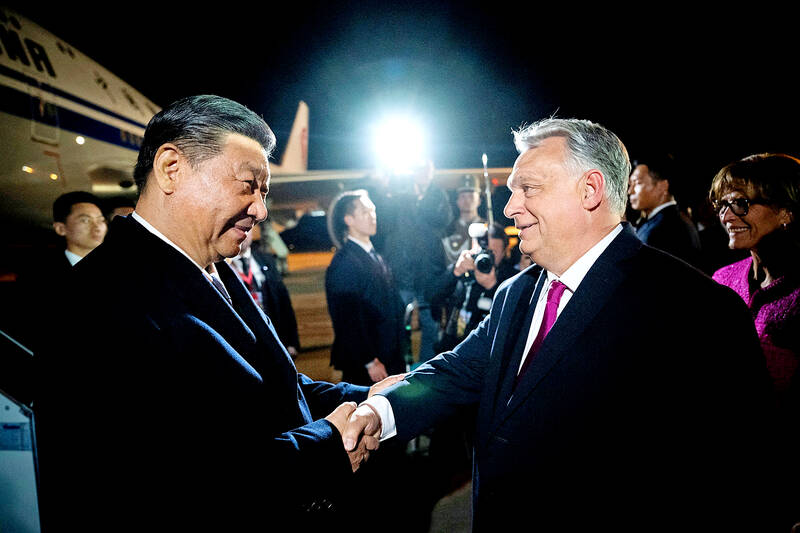Chinese President Xi Jinping (習近平) is set to announce a range of new investments in Budapest as he touts Prime Minister Viktor Orban’s Hungary as a model for what the EU’s relationship could look like with the world’s second-largest economy.
Xi was received by Hungarian President Tamas Sulyok yesterday as he started the final leg of his trip to Europe in five years, following stops in France and Serbia. During a meeting with Orban he is expected to announce more than a dozen deals covering rail, road and energy projects. Hungary’s cash-strapped government is also looking to lock in financing for some of the investments.
Xi is urging Europe to work with him to overcome trade tensions that threaten to derail a global economic recovery, holding up Hungary as an EU member where Beijing has managed to create a “strong, fruitful and dynamic” relationship.

Photo: AFP
“Our two countries need to lead regional cooperation and keep to the right direction of China-Europe relations,” Xi said in an op-ed published in the Hungarian ruling party’s newspaper Magyar Nemzet on Wednesday.
The comments coincide with growing tension between Beijing and Brussels, with European leaders accusing Xi’s government of flooding their markets with cheap exports that threaten jobs. Xi’s support for Russia despite its war in Ukraine has thrown the relationship further off balance.
Hungary has gone all-in on economic links with China under Orban’s leadership, attracting an estimated close to 10 billion euros (US$10.7 billion) in planned or ongoing investments over the past few years, mostly in the electric vehicle (EV) industry.
BYD Co, the Chinese EV giant, picked Hungary as the site of its first European car factory, edging out the likes of Germany and France, which had also coveted the investment. Hungary is also a hub for car battery producers, with China’s Contemporary Amperex Technology Co Ltd building a 7.3 billion euro plant in the eastern city of Debrecen.
The meetings in Budapest would hone in on expanding China’s economic footprint, much as they did in Serbia. The costly upgrade of an aging rail network and the construction of a long-delayed connection between Budapest Airport and the capital’s downtown are among the projects under discussion.
Those might complement a multi-billion dollar rail track modernization between Belgrade and Budapest as part of the Belt and Road Initiative, China’s global infrastructure project. Hungary is the only EU nation that is a part of the initiative.
Orban has frequently clashed with the US and the EU over the rule of law, as well as close ties to Russia and China, and has rejected Western pressure to reduce links with Beijing or to back a more critical approach on trade and human rights.

FREEDOM OF NAVIGATION: The UK would continue to reinforce ties with Taiwan ‘in a wide range of areas’ as a part of a ‘strong unofficial relationship,’ a paper said The UK plans to conduct more freedom of navigation operations in the Taiwan Strait and the South China Sea, British Secretary of State for Foreign, Commonwealth and Development Affairs David Lammy told the British House of Commons on Tuesday. British Member of Parliament Desmond Swayne said that the Royal Navy’s HMS Spey had passed through the Taiwan Strait “in pursuit of vital international freedom of navigation in the South China Sea.” Swayne asked Lammy whether he agreed that it was “proper and lawful” to do so, and if the UK would continue to carry out similar operations. Lammy replied “yes” to both questions. The

‘OF COURSE A COUNTRY’: The president outlined that Taiwan has all the necessary features of a nation, including citizens, land, government and sovereignty President William Lai (賴清德) discussed the meaning of “nation” during a speech in New Taipei City last night, emphasizing that Taiwan is a country as he condemned China’s misinterpretation of UN Resolution 2758. The speech was the first in a series of 10 that Lai is scheduled to give across Taiwan. It is the responsibility of Taiwanese citizens to stand united to defend their national sovereignty, democracy, liberty, way of life and the future of the next generation, Lai said. This is the most important legacy the people of this era could pass on to future generations, he said. Lai went on to discuss

MISSION: The Indo-Pacific region is ‘the priority theater,’ where the task of deterrence extends across the entire region, including Taiwan, the US Pacific Fleet commander said The US Navy’s “mission of deterrence” in the Indo-Pacific theater applies to Taiwan, Pacific Fleet Commander Admiral Stephen Koehler told the South China Sea Conference on Tuesday. The conference, organized by the Center for Strategic and International Studies (CSIS), is an international platform for senior officials and experts from countries with security interests in the region. “The Pacific Fleet’s mission is to deter aggression across the Western Pacific, together with our allies and partners, and to prevail in combat if necessary, Koehler said in the event’s keynote speech. “That mission of deterrence applies regionwide — including the South China Sea and Taiwan,” he

UNPRECEDENTED: In addition to the approved recall motions, cases such as Ma Wen-chun’s in Nantou are still under review, while others lack enough signatures The Central Election Commission (CEC) announced yesterday that a recall vote would take place on July 26, after it approved the first batch of recall motions targeting 24 Chinese Nationalist Party (KMT) lawmakers and Hsinchu Mayor Ann Kao (高虹安). Taiwan is in the midst of an unprecedented wave of mass recall campaigns, following a civil society push that echoed a call made by Democratic Progressive Party (DPP) caucus whip Ker Chien-ming (柯建銘) in January to initiate signature drives aimed at unseating KMT legislators. Under the Civil Servants Election and Recall Act (公職人員選舉罷免法), Taiwanese can initiate a recall of district-elected lawmakers by collecting